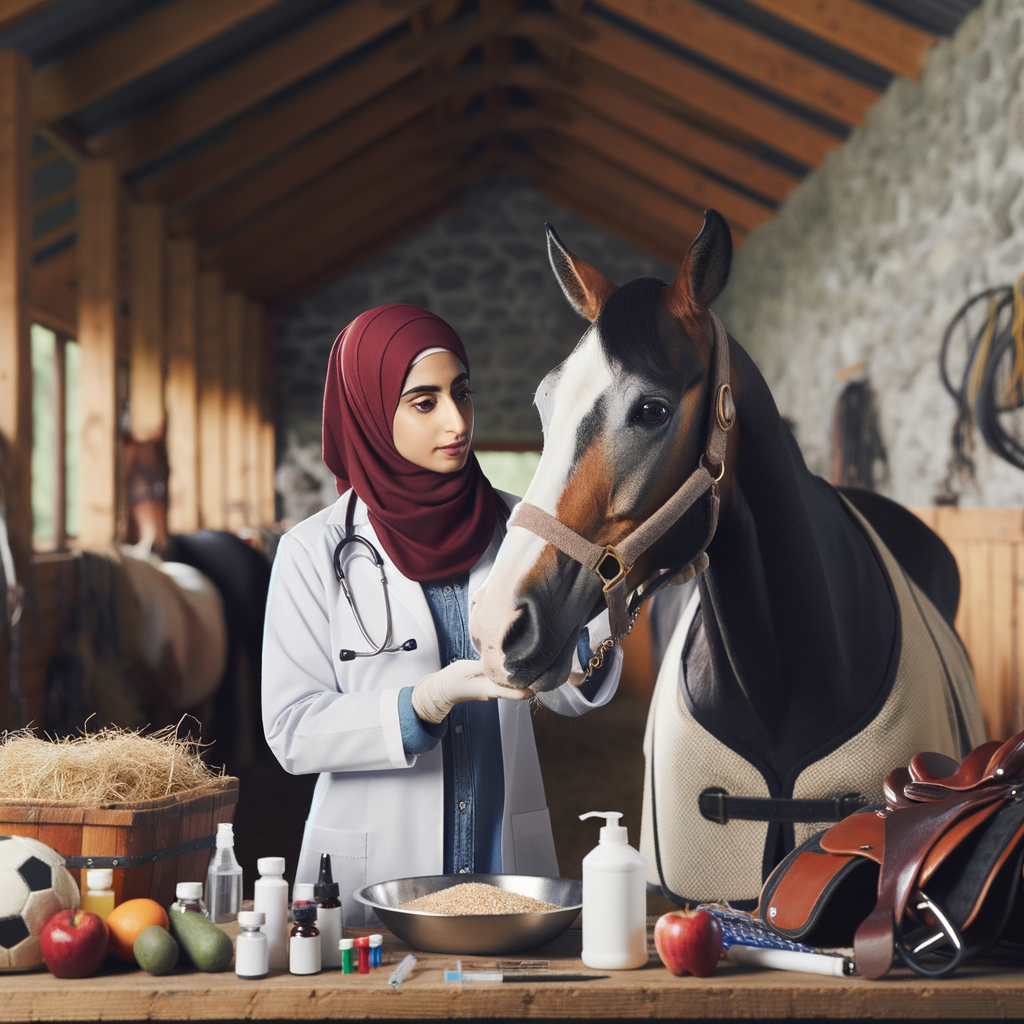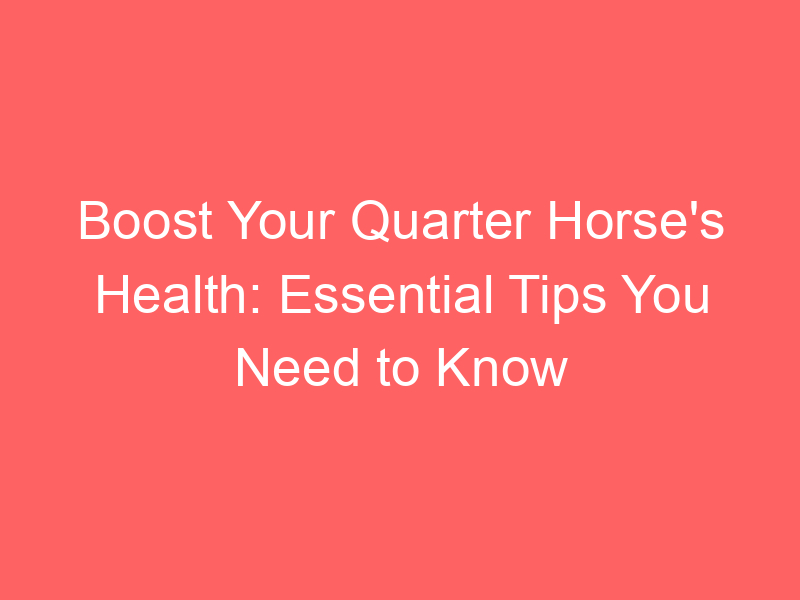
Introduction to Quarter Horse Health Care
When it comes to the well-being of our beloved equine companions, nothing should be left to chance. This is particularly true for Quarter Horses, a breed known for its agility, speed, and versatility. In this article, we will delve into the importance of maintaining Quarter Horse health and provide an overview of essential health tips for horses.
- Understanding the Importance of Maintaining Quarter Horse Health
- Essential Health Tips for Horses: An Overview
- Nutrition: A balanced diet is crucial. This should include a mix of forage, grains, and supplements as needed.
- Exercise: Regular exercise helps keep a horse’s muscles, heart, and lungs in top condition.
- Vaccinations and Parasite Control: Regular vaccinations and deworming are essential to protect against diseases and parasites.
- Dental Care: Regular dental check-ups can prevent many health issues.
- Hoof Care: Regular hoof care, including trimming and shoeing, is crucial to prevent lameness.
Quarter Horses, like all animals, require regular care and attention to ensure they remain healthy and happy. The importance of maintaining Quarter Horse health cannot be overstated. A healthy horse can perform at its best, whether that’s in the show ring, on the racetrack, or simply as a beloved pet. Moreover, a healthy horse is a happy horse, and there’s nothing more rewarding than seeing your equine friend thriving.
According to the American Quarter Horse Association, preventative health care is key. Regular check-ups, a balanced diet, and appropriate exercise can prevent many common health issues. Remember, it’s not just about treating illnesses when they occur, but about preventing them in the first place.
There are several key areas to focus on when it comes to horse health. These include:
By focusing on these areas, you can help ensure your Quarter Horse remains healthy and happy for many years to come.
Essential Health Tips for Quarter Horses
One of the most important aspects of caring for a Quarter Horse is ensuring they have a healthy diet. Here are some essential diet tips for your Quarter Horse.
Quarter Horse Diet Tips
- Understanding the nutritional needs of a Quarter Horse
- Creating a balanced diet plan
- Importance of hydration
Like all horses, Quarter Horses require a diet rich in nutrients to maintain their health and vitality. They need a good balance of proteins, carbohydrates, fats, vitamins, and minerals. The specific amounts can vary based on factors like age, activity level, and overall health. For example, a young, active horse may need more protein than an older, less active one.
Creating a balanced diet for your Quarter Horse is crucial. This means providing a mix of grains, hay, fruits, vegetables, and plenty of fresh water. It’s also important to feed your horse several small meals throughout the day, rather than one or two large ones. This is because horses’ stomachs are designed to process food slowly and steadily.
Hydration is just as important as nutrition. Horses need to drink between 5 and 10 gallons of water per day, depending on their size and the weather. Always ensure your horse has access to clean, fresh water. Dehydration can lead to serious health problems, including colic, so it’s important to monitor your horse’s water intake.
In conclusion, a healthy diet is essential for the well-being of your Quarter Horse. By understanding their nutritional needs, creating a balanced diet plan, and ensuring they stay hydrated, you can help your horse live a long, healthy life.
Exercise Tips for Quarter Horses
Just like humans, horses also need regular exercise to stay fit and healthy. This is particularly true for Quarter Horses, known for their agility and speed. Here are some exercise tips for Quarter Horses that can help maintain their health and performance.
- Creating an Effective Exercise Routine
- Understanding the Importance of Regular Exercise
- Adapting Exercise Routines for Different Age Groups
Creating an effective exercise routine for your Quarter Horse is crucial. Start with a warm-up, which can be a simple walk or a light trot. This helps to prepare their muscles for more intense activity. Gradually increase the intensity of the exercise, and always remember to cool down afterwards. This can help prevent injuries and ensure that your horse is getting the most out of their workout.
Regular exercise is essential for a Quarter Horse’s health. It helps to maintain their weight, strengthen their muscles, and improve their cardiovascular health. According to a study, horses that exercise regularly are less likely to develop health problems such as obesity and arthritis. Therefore, make sure your horse gets plenty of exercise every day.
It’s important to adapt the exercise routine based on your horse’s age. Young horses may require more vigorous exercise to burn off energy and build muscle, while older horses may need a more gentle routine to maintain their health without causing strain. Always consult with a veterinarian or an equine fitness expert to create an age-appropriate exercise routine for your Quarter Horse.
In conclusion, regular and effective exercise is a key component of a Quarter Horse’s health care. By understanding the importance of exercise and adapting routines to fit your horse’s age, you can ensure that your Quarter Horse stays fit, healthy, and ready for any challenge.
| Exercise Tips | Benefits |
|---|---|
| Effective Exercise Routine | Prevents injuries, improves performance |
| Regular Exercise | Maintains weight, strengthens muscles, improves cardiovascular health |
| Adapting Exercise Routines for Different Age Groups | Ensures age-appropriate exercise, prevents strain in older horses |
Maintaining Quarter Horse Health
Keeping your Quarter Horse healthy is a top priority for any horse owner. This involves regular health check-ups and being vigilant about potential health issues. Let’s delve into these aspects in more detail.
Regular Health Check-ups
Regular health check-ups are a crucial part of maintaining your Quarter Horse’s health. These check-ups allow for early detection and treatment of potential health issues, ensuring your horse stays in top shape.
- Importance of regular vet visits
- Common health issues to watch out for
Regular vet visits are essential for your Quarter Horse’s health. A vet can perform a thorough examination, identify any potential health issues, and provide necessary treatments. According to a study, horses that receive regular vet check-ups are less likely to develop serious health issues. These visits also provide an opportunity for you to ask any questions and get professional advice about your horse’s health and care.
There are several common health issues that Quarter Horses can face. These include lameness, respiratory diseases, and digestive problems. Being aware of these issues and their symptoms can help you detect them early and seek timely treatment. Here’s a brief overview:
| Health Issue | Symptoms |
|---|---|
| Lameness | Difficulty moving, limping, or reluctance to put weight on a limb |
| Respiratory Diseases | Coughing, nasal discharge, difficulty breathing |
| Digestive Problems | Loss of appetite, weight loss, changes in droppings |
Remember, early detection is key to effective treatment. Regular vet visits and being aware of common health issues can go a long way in maintaining your Quarter Horse’s health.
Preventive Health Measures for Quarter Horses
Preventive health measures are a crucial part of maintaining the health and well-being of your quarter horse. By taking steps to prevent disease and injury, you can ensure your horse lives a long, healthy, and happy life. Here are some key preventive measures you should consider:
- Vaccination and Deworming
- Proper Grooming Practices
- Importance of Dental Care
Vaccinations are a critical part of horse health care. They protect your horse from a variety of diseases, including equine influenza, tetanus, and West Nile virus. Deworming, on the other hand, helps to keep your horse’s digestive system healthy by preventing parasitic infections. According to a study, regular deworming can reduce the risk of colic in horses by up to 50%.
Grooming is not just about making your horse look good. It’s also an important part of their health care. Regular grooming helps to remove dirt, debris, and loose hair, and it also gives you a chance to check your horse for any signs of skin disease or injury. Moreover, grooming promotes blood circulation, which can contribute to a healthier coat and skin.
Just like humans, horses need regular dental care to maintain their overall health. Dental problems can lead to a variety of issues, including difficulty eating, weight loss, and behavioral changes. Regular dental check-ups by a qualified equine dentist can help to prevent these problems and ensure your horse’s teeth are in good condition.
In conclusion, preventive health measures are a key part of maintaining your quarter horse’s health. By ensuring your horse is regularly vaccinated and dewormed, properly groomed, and receives regular dental care, you can help to prevent a variety of health issues and ensure your horse lives a long, healthy life.
Healthy Lifestyle for Quarter Horses
Just like humans, horses also need a healthy lifestyle to thrive. This is especially true for Quarter Horses, a breed known for their agility, speed, and strong muscular build. A healthy lifestyle for these horses goes beyond just physical health. It also encompasses their mental health, which is often overlooked but equally important.
Importance of Mental Health
Mental health in horses is crucial for their overall well-being. It affects their behavior, performance, and even their physical health. Therefore, understanding horse behavior and mental health, and providing a stimulating environment are key to maintaining their mental health.
- Understanding Horse Behavior and Mental Health
- Providing a Stimulating Environment
Horses are intelligent creatures with complex behaviors and emotions. They can experience stress, anxiety, and even depression. Understanding these behaviors and emotions can help us better care for them. For instance, a horse that is constantly pacing, biting, or kicking may be showing signs of stress or anxiety. By recognizing these signs, we can take steps to alleviate their stress and improve their mental health.
A stimulating environment is vital for a horse’s mental health. Horses are naturally curious and active animals. They need space to run, play, and explore. They also need mental stimulation. This can be achieved by providing them with toys, introducing new objects to their environment, and regularly changing their surroundings. This not only keeps them physically active but also mentally engaged, which is beneficial for their mental health.
In conclusion, mental health is a crucial aspect of a healthy lifestyle for Quarter Horses. By understanding their behavior and providing a stimulating environment, we can help ensure their mental well-being, which in turn contributes to their overall health and happiness.
Importance of Social Interaction
Just like humans, horses are social creatures. They thrive in environments where they can interact with their peers. This section will delve into the benefits of social interaction for horses and provide tips on how to create a social environment for your Quarter Horse.
-
Benefits of Social Interaction for Horses
Social interaction plays a crucial role in the overall health and well-being of horses. Here are some of the key benefits:
- Physical Health: Horses that interact with others tend to be more active, which contributes to their physical health. They run, play, and engage in activities that help them maintain a healthy weight and muscle tone.
- Mental Health: Social interaction helps horses avoid boredom and depression. It stimulates their minds, keeping them alert and engaged.
- Behavioral Development: Young horses learn important social and behavioral skills from their peers. These interactions help them understand their place in the herd and how to behave appropriately.
-
Creating a Social Environment for Your Quarter Horse
Creating a social environment for your Quarter Horse is not as challenging as it may seem. Here are some tips to help you:
- Provide Plenty of Space: Horses need ample space to move around and interact with each other. Ensure that your horse has enough room to run, play, and engage with other horses.
- Introduce New Horses Gradually: If you’re introducing a new horse to the herd, do it gradually. This will help prevent aggression and ensure a smooth transition.
- Monitor Interactions: Keep an eye on your horse’s interactions with others. If you notice any signs of aggression or bullying, intervene immediately.
In conclusion, social interaction is a vital part of a horse’s life. It contributes to their physical health, mental well-being, and behavioral development. As a Quarter Horse owner, it’s your responsibility to create a social environment that allows your horse to thrive.
Conclusion: Care for Your Quarter Horse
In conclusion, caring for your Quarter Horse requires a comprehensive understanding of their health needs. It’s not just about feeding them and ensuring they have a clean stable. It’s about understanding their unique health requirements and providing a lifestyle that supports their overall well-being.
- Recap of essential health tips for Quarter Horses
- Importance of a holistic approach to horse health care
Throughout this article, we’ve highlighted several key health tips for Quarter Horses. We’ve discussed the importance of regular vet check-ups and vaccinations to prevent diseases. We’ve also emphasized the need for a balanced diet, rich in nutrients, to maintain their energy levels and overall health. Regular exercise is crucial to keep your horse fit and prevent obesity-related health issues. Lastly, we’ve stressed the importance of proper grooming and hoof care to prevent skin diseases and other related problems.
As we’ve seen, horse health care is not a one-size-fits-all approach. It requires a holistic view, considering all aspects of the horse’s life. This includes their diet, exercise routine, mental health, and environment. By adopting a holistic approach, you can ensure your Quarter Horse is not just surviving, but thriving. They will be happier, healthier, and more likely to live a long and fulfilling life.
Remember, your Quarter Horse relies on you for their health and well-being. By following these tips and adopting a holistic approach, you can provide the best possible care for your horse.
As the famous equestrian author, Pam Brown once said, “A horse is the projection of peoples’ dreams about themselves – strong, powerful, beautiful – and it has the capability of giving us escape from our mundane existence.” Let’s ensure we give these magnificent creatures the care they deserve.






